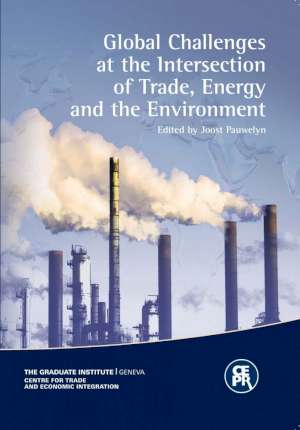17 June 2011
Global Challenges at the Intersection of Trade, Energy and the Environment
Ed Joost Pauwelyn
2010, Centre for Economic Policy Research, 236 pages, £10.00
ISBN 9781907142048
Reviewer: Benedikt Koehler

Climate-change policies, arguably the most pressing issue calling for global coordination, hitherto have somewhat surprisingly been peripheral to the agenda of Geneva-based institutions such as the World Trade Organisation. Energy supply traditionally has been the preserve either of national jurisdiction or of international cartels (OPEC), and international trade agreements consequently have not addressed climate-change policies, the “world’s biggest market failure” (to quote Lord Stern). This book gathers proceedings of a conference held in 2008 in Geneva, home and host to many organisations and research institutes focussed on multilateral trade issues. This volume contains twenty presentations by experts drawn from multilateral institutions (including OPEC), industry, law firms and industry associations on future challenges to desegregate energy, trade and climate-change policies.
In the long run, national energy supply management will require compatibility with the agenda of international climate-change policies. Since trade in fossil fuels comprises some 15% of cross-border trade, this evolution would imply a substantive expansion of the remit of the WTO. The WTO would bring considerable expertise to these tasks, since energy policies have long relied on government subsidies and thus implicitly discriminate between energy sources. Subsidies underpin the market structure of national energy policies. For example, the US in 1999 channelled over $6 billion to its domestic fossil energy sector. In the meantime, subsidies and tariffs for green energy have proliferated, with differential tariffs for fuels such as biodiesel and ethanol further distorting market-led investment flows. The Global Subsidies Initiative of the International Institute for Sustainable Development will add grist to the mill of those making the case for placing climate-change policies on the agenda of trade agreements.
Integrating climate-change and trade policies would be a fertile field for the methodology of law and economics. A consensus has yet to emerge where to draw the demarcation lines for prospective trade policies. Assuming, for the sake of argument, a Ricardian international trade regime would impose differential trade tariffs according to an individual country’s comparative advantage in generating energy, then fair rules would need to assess the particulars of each country’s energy production mix. A pertinent legal precedent might be the ‘shrimp turtle case,’ where US NGOs sued for the imposition of punitive tariffs on Asian shrimp imports, which proceeded from the allegation of unfair trade practice because Asian fishing fleets ignored collateral damage on the turtle population in Asian waters. By this logic, punitive tariffs are legitimatised where there is a production process that is not truly cost-reflective. By analogy, the same legal rationale could be applied to energy-intensive goods. Aluminium, for example, requires so much energy in its production it is effectively ‘canned energy.’ Further legal challenges lie ahead for expanding the rules for international trade in carbon emission rights, where “it is unclear whether emission rights are commodities, currency-like units, or something else, such as securities,” (Heng Wang, p 171).
This volume of conference proceedings merits the attention of readers with an interest in the overlap between energy and climate-change policies, and in policies for energy subsidies, pricing, and fiscal incentives for renewables.
